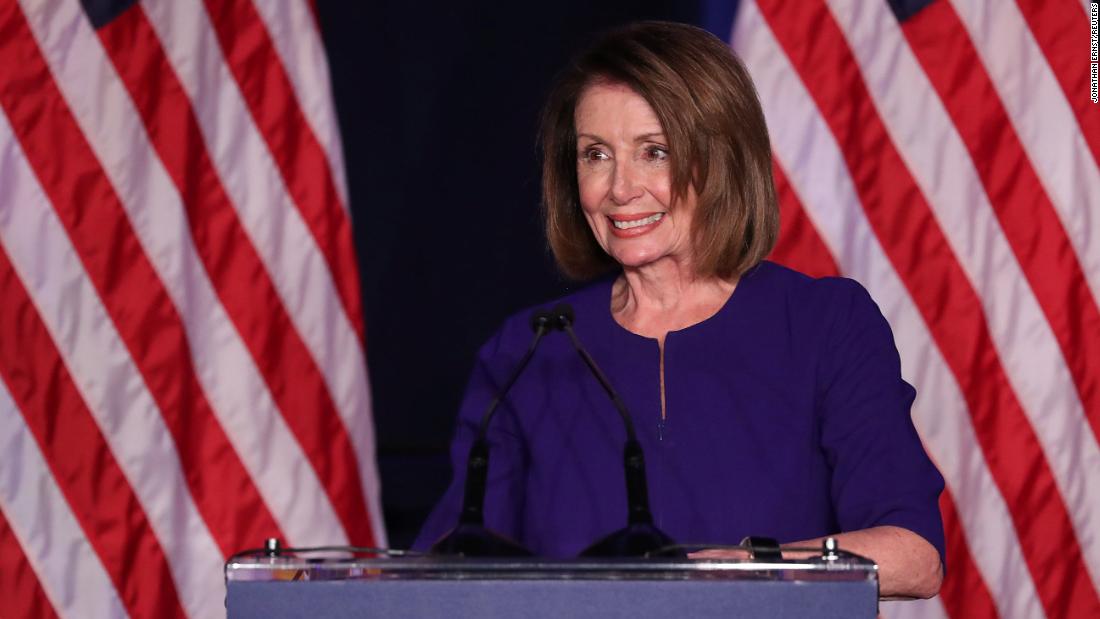
They claim that it's time for new leadership, after Democrats won a majority on a message of change. Fair enough. Pelosi has been in Congress since the 1980s. Some members are tired of the same leadership. (Polling indicates that a number of voters feel that way.)
Speakers, though, have almost always had many years of experience. Would-be speakers typically rise through the ranks. Even Paul Ryan, a Wisconsin Republican who was not the first in line to become speaker in 2015, had been a member of the House since 1999.
From my perspective, there are two big reasons why a candidate for speaker wouldn't be a good fit: She or he hurts her or his party electorally or the speaker is not representative of the party they represent. I don't think either of these reasons applies to Pelosi when you look at the numbers.
It is true that the California Democrat is unpopular. Back in August, for example, a Fox News poll put Pelosi's favorable rating at 29% to an unfavorable rating of 54%. That's not very good. Of course, most congressional leaders have lousy favorability ratings. Senate Majority Leader Mitch McConnell had a 22% favorable rating and an unfavorable rating of 52% in the same poll. The Kentucky Republican's net favorable rating (favorable minus unfavorable) was 5 points worse than Pelosi's in that poll.
Interestingly, you don't hear a lot of Republicans clamoring to replace McConnell right now. It could be that Democrats haven't been as effective as Republicans in using the opposing party's leadership in Congress as a political attack. It may also be that Republicans understand that most people don't vote for Congress based on who the leader will be.
Earlier this year, I looked at how well congressional leader popularity predicted House results. It turned out there was little correlation with the approval or favorable rating of these leaders and how people end up voting for the House.
Indeed, there's a history of voters electing and then re-electing majorities to Congress even when they don't like the person who would most likely be House speaker. We saw that in 1994, 1998, 2014 and now 2018. Likewise, there are years when speakers who aren't all that unpopular seeing their parties voted out (see 1994 and 2006).
People instead are far more likely to base their votes for Congress on how they feel about the president. A CNN poll taken earlier this year found that only 34% of voters said Pelosi was an important factor in their midterm votes, while 68% said President Donald Trump was. Not surprisingly, the President's net approval rating in the exit polls (-9 points) matched nearly perfectly with the Republican deficit in the House popular vote (currently 8 points).
Think of it another way. If Pelosi was such an electoral albatross, Democrats wouldn't be heading toward their biggest net gain in the House since Watergate.
The other main argument one could lodge against someone being speaker is she or he is not representative of the caucus she or he is representing.
Ideologically, Pelosi is a good fit for her party. The Democratic Party is moving further to the left. A record percentage of Democrats identify as liberal, according to Gallup. In this year's exit poll, a record percentage of all voters identified as liberal.
Pelosi is very liberal. According to Voteview, which measures ideology through roll call votes, Pelosi was more liberal than more than 80% of Democratic House members this Congress. She was more liberal than 93% of all House members this Congress.
Pelosi's liberalness may be why those who want her dislodged are primarily in the center of the electorate. This includes incoming freshmen like Abigail Spanberger, who hails from a Virginia district Trump won by over 6 points, and Conor Lamb of Pennsylvania, who was the most moderate House member this Congress.
On the other hand, more liberal members of the House are generally supportive of Pelosi. Incoming member Alexandria Ocasio-Cortez of New York has said she is "going to support the most progressive candidate that's leading the party and right now that is Nancy Pelosi, in terms of running."
Perhaps less spoken about is that Pelosi is a woman in a party in which women are playing a bigger and bigger role. It could be argued that a woman should lead a party whose voters are overwhelmingly women. In the exit polls, 58% of those who cast House ballots for the Democratic Party were women.
Democratic voters also made it clear that they wanted women to represent them. Women were nominated at a record pace in Democratic primaries. There are going to be 89 women serving in the Democratic caucus next year, according to the Center for American Women and Politics at Rutgers University. That's a record, and 28 more than are serving now.
Without Pelosi, it's possible that there wouldn't be a woman in a position of power representing the party. Rep. Marcia Fudge of Ohio, who was toying with a challenge to Pelosi, would have alleviated that problem. Fudge, though, has decided she won't challenge Pelosi.
Fudge would have been an interesting option for another reason: She's African-American. That would have presented Democrats with the opportunity to reflect the diversity of their party in their leadership selection. Nonwhite voters are far more likely to be Democrats than Republicans, though a larger share of Democratic voters are white than nonwhite.
The bottom line, however, is that it still makes a lot of sense for Democrats to elect Pelosi as speaker. Her strengths outweigh her weaknesses, from an electoral and representative angle. That's probably why no one has stepped forth to challenge her yet.
Bagikan Berita Ini















0 Response to "Why Nancy Pelosi makes a lot of sense as speaker"
Post a Comment